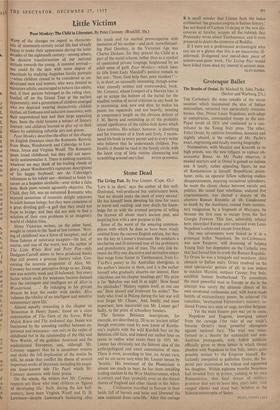Grotesque Ballet
The Bombs of Orsini. By Michael St. John Packe.
(Seeker and Warburg, 25s.) THE Carbonari, the most notable of the secret societies which maintained the idea of Italian nationalism, attracted two particularly romantic heroes. One, Prince Louis Napoleon, arch-adept at conspiracies, commanded troops in the anti- Papal revolt of 1831 and continued as a con- tributor to the Young Italy press. The other, Felici Orsini, by contrast breathless, innocent and slightly absurd, is the subject of Mr. Packe's exact, engrossing and finally moving biography.
Nationalism, with Mazzini and Kossuth as its high priests, was the new religion to replace ob- scurantist Rome. As Mr. Packe observes, it needed martyrs and in Orsini it gained an outsize one. A lonely, rather appealing, figure, he was all Romanticism in himself. Republican, priest- hater, exile, an operatic fellow suffering endless disappointments, enjoying occasional splendours, he made the classic choice between suicide and politics. He raised four rebellions, endured five imprisonments, was elected a deputy of the abortive Roman Republic of '48. Condemned to death by the Austrians, roused from momen- tary resignation by a fragment of Mazeppa, he became the first man to escape from, the San Giorgio Fortress. This feat, admirably related here, electrified Europe and surpassed even Louis Napoleon's celebrated escape from Ham.
The two adventurers were linked as if in a grotesque ballet. Napoleon, the ex-Carbonaro, was now Emperor, still dreaming of helping Young Italy but dependent on the Catholic vote that had forced him to crush the Roman Republic. To Orsini he was a renegade and murderer, chief obstacle to Italian unity. Orsini resolved on the most spectacular gesture of all; in One instant to outclass Mazzini, outpace Cavour, free Italy, establish human brotherhood. To assassinate the most powerful man in Europe or die in the attempt was surely the ultimate climax of his own emotional restlessness and, with home-made bombs of extraordinary power, he achieved 156 casualties, 'overturned Palmerston's ministry, re- duced France to a state of siege, terrified Belgium. . . .' Yet the most bizarre part was yet to come.
Napoleon and Eugenie, emerging unhurt from the carnage ('the risks of our trade'), became Orsini's most powerful champions against national fury. The trial was trans- formed to a theatre for nationalist and anti- Austrian propaganda, with fullest publicity officially given to three letters in which Orsini pleaded with Napoleon to free Italy, letters quite possibly written by the Emperor himself. Re- luctantly compelled to guillotine Orsini, the Im- perial pair maintained his widow and supported his daughter. Within eighteen months Napoleon had invaded Italy in person, yielding to his own Romanticism, that fatal dream of military grandeur that was to leave him, years later, with rouged cheeks and dyed hair, helpless in the hideous catastrophe of Sedan.
pE I Elt VAN 41 l I Alt


























 Previous page
Previous page